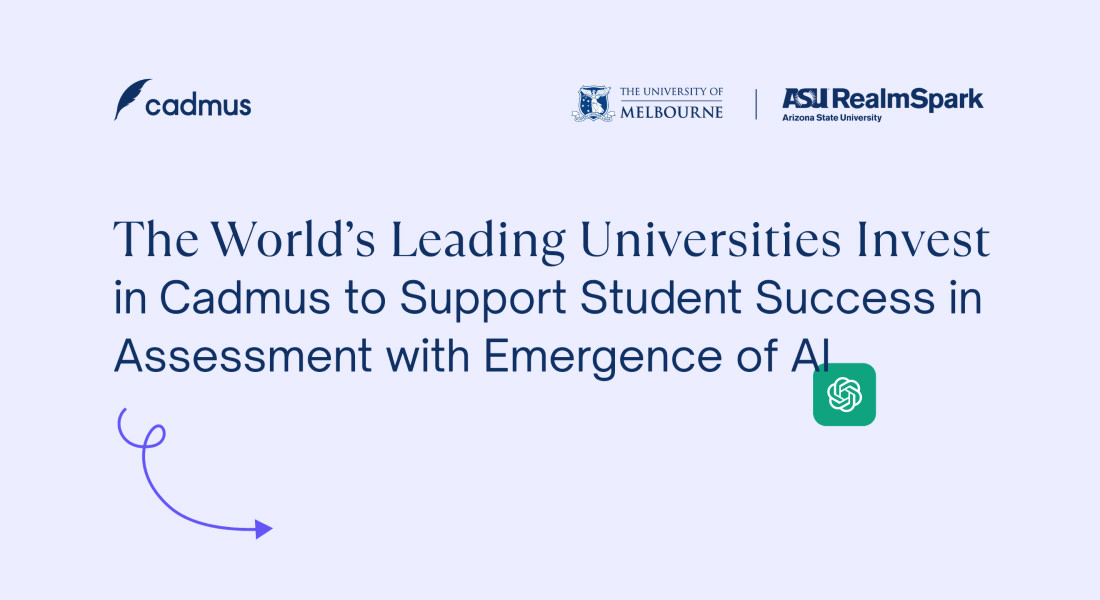Choosing the right assessment platform

With online and blended learning models becoming the new normal, and an influx of edtech products hitting the market through the pandemic, it can be difficult to understand where different solutions fit and how they add value to your university's digital technologies suite.
More importantly, it can be tricky to identify which tools provided a quick solution to the 2020 remote learning transition, and which align best with your teaching and learning strategy — now and into the future.
We’ve broken down the benefits and drawbacks of a range of online assessment solutions, specifically focussed on delivering formative and summative written tasks, like essays, reports, exams, and tests. These solutions are commonly known as assessment platforms.
What is an assessment platform?
An assessment platform is an online application that facilitates the end-to-end assessment workflow for educators and students. This involves:
Designing an assessment
Delivering it to students
Students completing and submitting the task, and
Teachers providing feedback
The majority of assessment platforms that exist today (also known as testing and proctoring platforms) are heavily focused on the administration of high-stakes assessments like exams and tests. They offer a range of benefits in streamlining traditionally paper-based processes and providing assessment security through video surveillance and other technologies.
For more formative assessments, we often see the Learning Management System (LMS) playing the role of ‘assessment platform’. Educators can share assessment instructions and resources, and students can upload a file as a submission. This simplistic process offers a level of convenience for teachers and students, utilising the LMS as a tool for the transmission of content.
What are the problems with traditional assessment platforms?
Providing a quick solution for delivering invigilated exams online, proctoring and testing platforms gained popularity through COVID-19. Last year, in Australia alone, 50% of universities opted to use proctoring services for exams with mixed success (ACODE, 2020). The use of these platforms raised concerns around student privacy, accessibility, and the technical stability of major providers. In addition to these concerns, it is also important to look more fundamentally, at the validity and necessity of the level of assessment security these platforms encourage.
When looking at teaching and learning best practice, we see that high-stakes, surveillance-style assessment can lead to poor learning and assessment of learning (Dawson, 2021).
Proctoring and testing platforms provide little opportunity for higher-order thinking skills to be developed and assessed, limiting their ongoing relevance in an evolving educational landscape.
With increasing pressure to develop graduate capabilities in students, universities are shifting towards more authentic and learning-centred assessment design. For many courses, conducting open book assessments improves learning outcomes and student experience. This raises the question — is investment in a high-stakes assessment platform a future-proof solution?

What about assessment via the LMS?
As an integral part of the digital learning experience, Learning Management Systems have extended to support stages of the assessment workflow. At a surface level, these platforms seemingly fulfil the assessment needs of educators and students. However, "while the LMS has been successful in the administration of learning, it has been less successful in enabling learning itself" (EDUCAUSE, 2015). This is no surprise when we consider why the LMS was developed: to deliver and manage content within a subject — not to enhance student learning.
By design, the LMS disconnects students from support throughout their entire assessment experience, providing no insight into student progress and limited opportunities for teachers to course-correct or guide learning.
Without this learning support, we see students disengage, fail, or become more likely to cheat (TEQSA, 2017) — all the more relevant in a fully remote or blended learning setting. As universities hope to stay competitive by delivering superior learning experiences, is assessment through the LMS the best we can offer students?
Putting learning at the heart of assessment
Research has shown that prioritising learning can lead to improvements in student experience, academic integrity, student success, and graduate outcomes (Biggs, 1999, Carless, 2017, Bertram-Gallant, 2017). As we continue to see assessment for learning principles integrated into university policies, and radical shifts away from invigilated exams, we can only expect an increase in the amount of learning-centred assessment conducted in higher education.
A new wave of assessment platforms are aligning themselves with this vision, prioritising student learning and success over assessment administration and security.
This new category of platforms target assessment holistically, combining teaching and learning best practice with a seamless user experience to improve student outcomes.
In addition to the workflow benefits of digital assessment platforms, assessment for learning platforms provide assessment design guidance for teachers, integrated support and educative nudges for students, and actionable learning analytics to improve teaching effectiveness and maintain academic integrity.

Is an assessment for learning platform the right fit for your institution?
For innovative universities prioritising student experience and success, the right technology solution can improve assessment practices in every course and subject, reducing the time taken to lift assessment quality institution-wide.
As a leading assessment for learning platform, Cadmus is a cost-effective way to achieve better assessment experiences at scale.
Universities using Cadmus have seen increased student success in everything from in-semester, formative assessment to alternatives to proctored exams. By choosing an assessment platform that addresses assessment holistically, our partners have been able to deliver flexible learning experiences and drive better outcomes for students. Will your university be next?
To learn more about how Cadmus facilitates learning-centred assessment experiences, take a closer look at the platform or speak to our team.

Keep learning…
The latest in teaching and learning. Delivered to your inbox.



